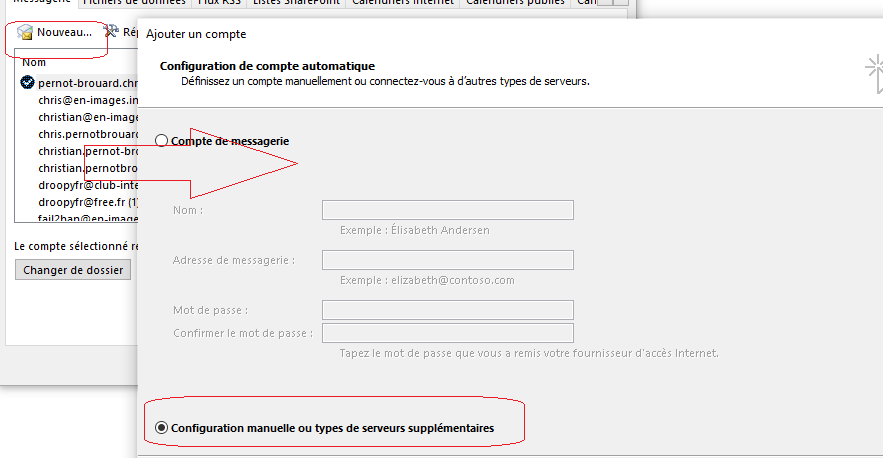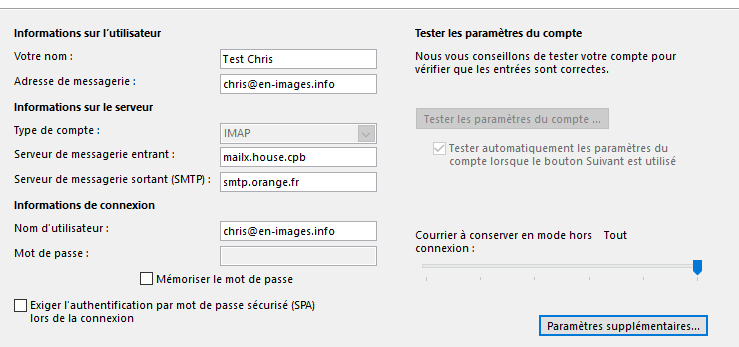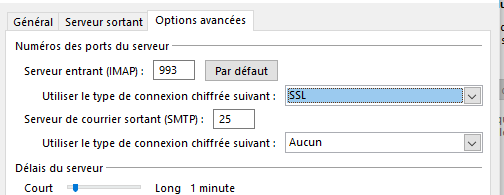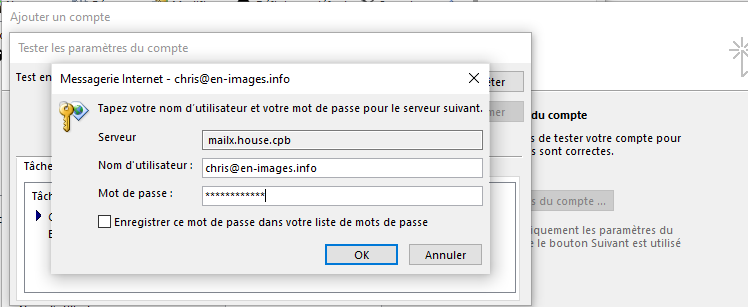1°) Installation DEBIAN 9
Partie Machine et Système
Nom de la machine

Nom du Domaine Local

Installer une version minimale de Linux afin de déployer une machine avec uniquement nos besoins.
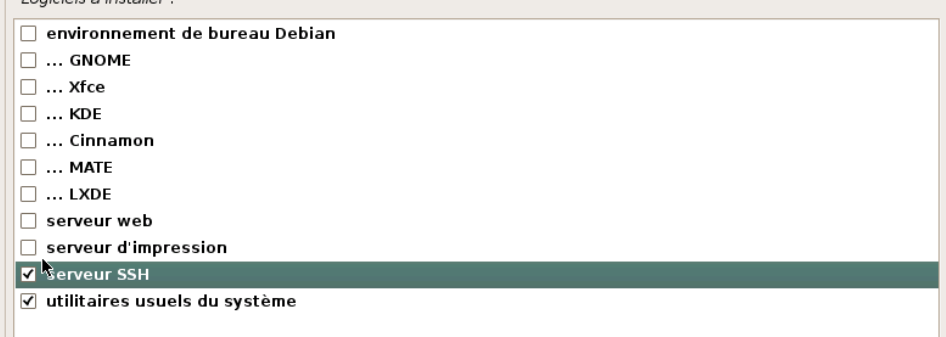
Installation de base terminée

Partie Réseau
Nous allons fixer une IP statique sur notre serveur, l’IP sera 192.168.1.10/24
root@mailx:/home/cp219538# vi /etc/network/interfaces ################ # IP FIXE MAILX ################ allow-hotplug ens18 iface ens18 inet static address 192.168.1.10 netmask 255.255.255.0 gateway 192.168.1.1 dns-nameservers 192.168.1.1
root@mailx:/home/cp219538# systemctl restart networking.service

Désactivons l’IPv6
root@mailx:/home/cp219538# vi /etc/sysctl.conf
##################
# IPV6 à OFF
#################
# désactivation de ipv6 pour toutes les interfaces
net.ipv6.conf.all.disable_ipv6 = 1
# désactivation de l’auto configuration pour toutes les interfaces
net.ipv6.conf.all.autoconf = 0
# désactivation de ipv6 pour les nouvelles interfaces (ex:si ajout de carte réseau)
net.ipv6.conf.default.disable_ipv6 = 1
# désactivation de l’auto configuration pour les nouvelles interfaces
net.ipv6.conf.default.autoconf = 0
root@mailx:/home/cp219538# sysctl –p
net.ipv6.conf.all.disable_ipv6 = 1
net.ipv6.conf.all.autoconf = 0
net.ipv6.conf.default.disable_ipv6 = 1
net.ipv6.conf.default.autoconf = 0

L’IPv6 est désormais désactivé.
Mettre à jour la liste des /etc/hosts
root@mailx:/home/cp219538# vi /etc/hosts 127.0.0.1 localhost #127.0.1.1 mailx.house.cpb mailx 192.168.1.10 mailx.house.cpb mailx
Installation MySQL 8.0
root@mailx:/home/cp219538# apt-get update && apt-get dist-upgrade root@mailx:/home/cp219538# wget http://repo.mysql.com/mysql-apt-config_0.8.13-1_all.deb root@mailx:/home/cp219538# dpkg -i mysql-apt-config_0.8.13-1_all.deb

« OK »
root@mailx:/home/cp219538# apt update && apt upgrade

root@mailx:/home/cp219538# apt install mysql-server

« Mot de passe Root pour Mysql »

« Use Legacy Auth…. »
root@mailx:/home/cp219538# systemctl enable mysql root@mailx:/home/cp219538# systemctl start mysql
3°) Installation POSTFIX et Dépendances
Installation Postfix
root@mailx:/home/cp219538# apt-get install postfix postfix-mysql procmail

« Site Internet »

« Nom de la machine Serveur Mail Local »
Création de l’utilisateur/Base Postfix pour PostfixAdmin
root@mailx:/home/cp219538# mysql -u root -p
Enter password:
Welcome to the MySQL monitor. Commands end with ; or \g.
Your MySQL connection id is 8
Server version: 8.0.22 MySQL Community Server – GPL
Copyright (c) 2000, 2020, Oracle and/or its affiliates. All rights reserved.
Oracle is a registered trademark of Oracle Corporation and/or its
affiliates. Other names may be trademarks of their respective
owners.
Type ‘help;’ or ‘\h’ for help. Type ‘\c’ to clear the current input statement.
mysql> CREATE database postfix;
Query OK, 1 row affected (0.01 sec)
mysql> CREATE USER ‘postfix’@’localhost’ IDENTIFIED BY ‘VOTRE_MOT_PASSE_POSTFIX’;
Query OK, 0 rows affected (0.01 sec)
mysql> GRANT USAGE ON *.* TO ‘postfix’@’localhost’;
Query OK, 0 rows affected (0.00 sec)
mysql> GRANT ALL PRIVILEGES ON postfix.* TO ‘postfix’@’localhost’;
Query OK, 0 rows affected (0.00 sec)
mysql> exit
Bye
Spécifications PostFix dans Mysql
root@mailx:/home/cp219538# vi /etc/mysql/my.cnf
[client]
default-character-set=utf8
[mysql]
default-character-set=utf8
[mysqld]
collation-server = utf8_unicode_ci
character-set-server = utf8
default_authentication_plugin = mysql_native_password
root@mailx:/home/cp219538# systemctl restart mysql root@mailx:/home/cp219538# iptables -A INPUT -p tcp --dport 3306 -j ACCEPT

4°) Installation NGINX
root@mailx:/home/cp219538# apt install nginx curl
Test fonctionnement de NGINX.
root@mailx:/home/cp219538# curl -I 127.0.0.1
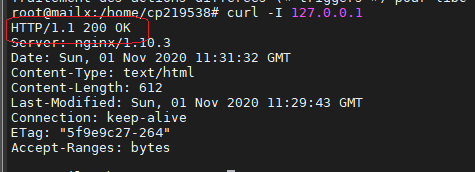
Ajout des port http et https dans le firewall
root@mailx:/home/cp219538# iptables -A INPUT -p tcp --dport 80 -j ACCEPT root@mailx:/home/cp219538# iptables -A INPUT -p tcp --dport 443 -j ACCEPT

root@mailx:/home/cp219538# systemctl restart nginx && systemctl enable nginx Synchronizing state of nginx.service with SysV service script with /lib/systemd/systemd-sysv-install. Executing: /lib/systemd/systemd-sysv-install enable nginx
5°) Installation POSTFIX Admin 3.2
Installation
root@mailx:/home/cp219538# cd /var/www root@mailx:/var/www# wget http://downloads.sourceforge.net/project/postfixadmin/postfixadmin/postfixadmin-3.2/postfixadmin-3.2.tar.gz root@mailx:/var/www# tar -xzf postfixadmin-3.2.tar.gz root@mailx:/var/www# mv postfixadmin-3.2 postfixadmin root@mailx:/var/www# rm -rf postfixadmin-3.2.tar.gz root@mailx:/var/www# chown -R www-data:www-data postfixadmin
6°) Installation PHP 5.6
root@mailx:/var/www# apt install ca-certificates apt-transport-https lsb-release root@mailx:/var/www# wget -q https://packages.sury.org/php/apt.gpg -O- | apt-key add - root@mailx:/var/www# echo "deb https://packages.sury.org/php/ $(lsb_release -sc) main" | tee /etc/apt/sources.list.d/php.list root@mailx:/var/www# apt update && apt upgrade root@mailx:/var/www# apt install php5.6 root@mailx:/var/www# apt install php5.6-cli php5.6-common php5.6-curl php5.6-mbstring php5.6-mysql php5.6-xml php5.6-imap php5.6-fpm
Démarrage des services PHP5 et NGINX
root@mailx:/var/www# service php5.6-fpm start root@mailx:/var/www# systemctl enable php5.6-fpm Synchronizing state of php5.6-fpm.service with SysV service script with /lib/systemd/systemd-sysv-install. Executing: /lib/systemd/systemd-sysv-install enable php5.6-fpm root@mailx:/var/www# service nginx restart
7° Configuration POSTFIX Admin 3.2
Configuration du site php POSTFIX Admin
root@mailx:/var/www# cp /var/www/postfixadmin/config.inc.php{,.ori}
root@mailx:/var/www# vi /var/www/postfixadmin/config.inc.php $CONF['configured'] = true; $CONF['default_language'] = 'fr'; $CONF['database_type'] = 'mysqli'; $CONF['database_host'] = 'localhost'; $CONF['database_user'] = 'postfix'; $CONF['database_password'] = 'Votre_MOT_DE_PASSE_MYSQLserver'; $CONF['database_name'] = 'postfix'; $CONF['database_prefix'] = 'postfix_'; $CONF['admin_email'] = 'chris@en-images.info'; $CONF['domain_path'] = 'YES'; $CONF['domain_in_mailbox'] = 'NO'; $CONF['fetchmail'] = 'NO';
root@mailx:/var/www# cp /var/www/postfixadmin/config.inc.php /var/www/postfixadmin/config.local.php root@mailx:/var/www# chown www-data:www-data /var/www/postfixadmin/config.local.php
root@mailx:/var/www/postfixadmin# mkdir /var/www/postfixadmin/templates_c root@mailx:/var/www/postfixadmin# chown -R www-data:www-data /var/www/postfixadmin/templates_c
Configuration du site Postfix Admin sur NGINX
root@mailx:/var/www# vi /etc/nginx/sites-enabled/postfixadmin.conf server { listen 80; server_name mailx.house.cpb; root /var/www/postfixadmin; index index.php; charset utf-8; location / { try_files $uri $uri/ index.php; } location ~* \.php$ { include /etc/nginx/fastcgi_params; fastcgi_pass unix:/var/run/php/php5.6-fpm.sock; fastcgi_index index.php; fastcgi_param SCRIPT_FILENAME $document_root$fastcgi_script_name; } }
root@mailx:/var/www# service nginx restart
Pour le test, on ajoute sur la machine Windows du DEV, une entrée host dans le fichier « C:\Windows\System32\drivers\etc\hosts »
192.168.1.10 mailx.house.cpb
8°) Configuration Web Postfix Admin
L’accès de la partie de configuration se fait via l’adresse URL => http://mailx.house.cpb/public/setup.php
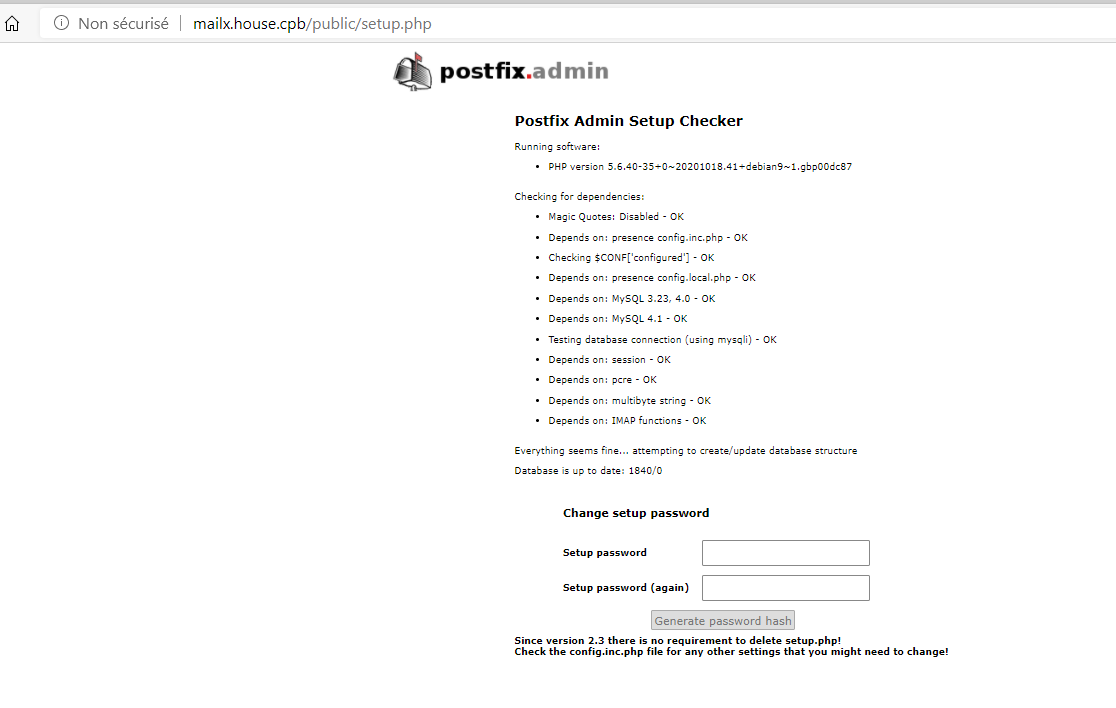
Générer un Password HASH pour l’administrateur de POSTFIX Admin
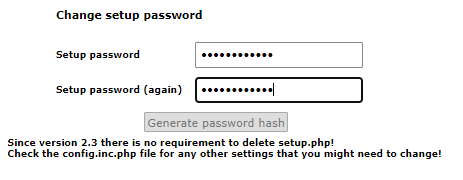
Ajouter le HASH code sur la variable « Setup_password » du fichier config.local.php


Création Compte « SuperAdmin » pour la gestion des Users/Domain du Site
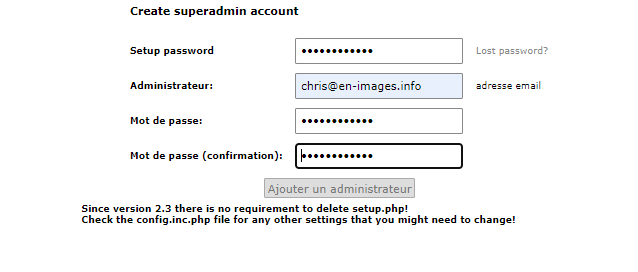

9°) Configurer Serveur de Mail Local via Postfix Admin

Ajouter un domaine sur le serveur de mail

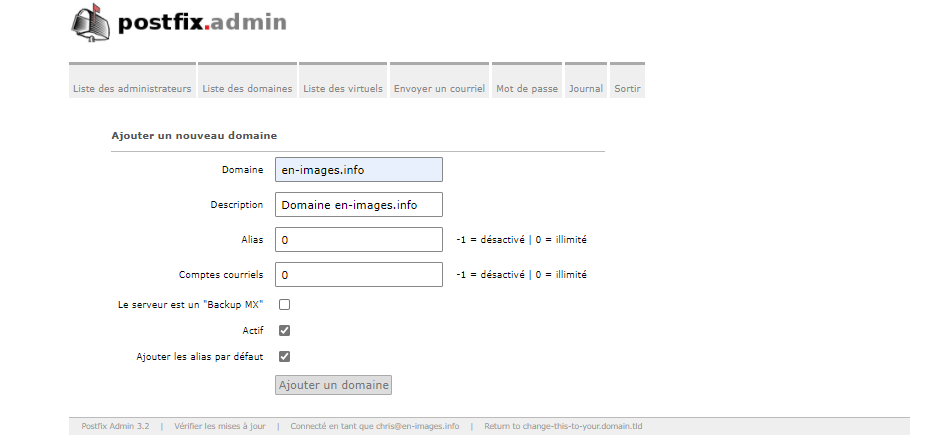
Ajouter Utilisateur sur le serveur de mail

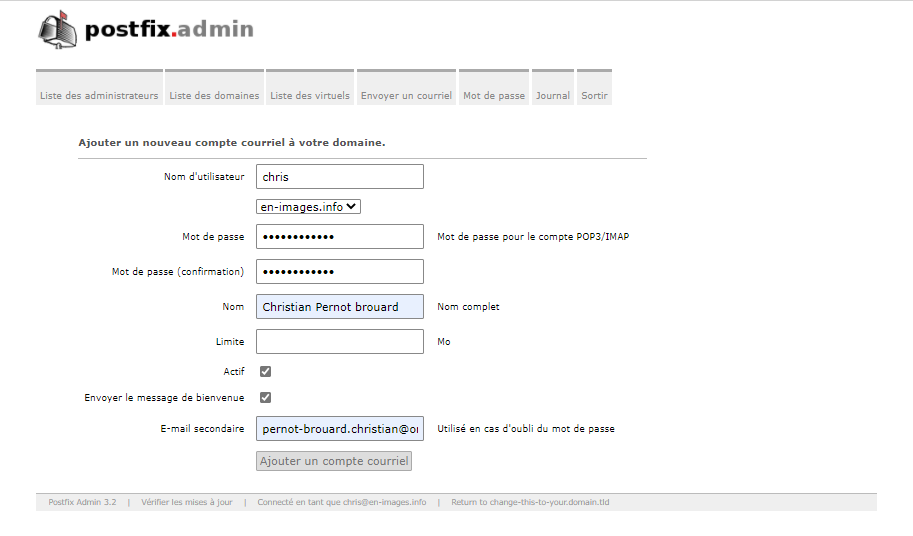
Modifier les Alias par défaut du Postfix Admin


Modier les « change-this.. » par « en-images.info »

10°) Génération des Certificats (KEY CA , KEY Serveur , DH)
Génération du certificat KEY CA (Certificate Authority)
root@mailx:/var/www/postfixadmin# cd /home root@mailx:/home# openssl genrsa -out ca.key.pem 4096
root@mailx:/home# openssl req -x509 -new -nodes -days 1460 -sha256 -key ca.key.pem -out ca.cert.pem You are about to be asked to enter information that will be incorporated into your certificate request. What you are about to enter is what is called a Distinguished Name or a DN. There are quite a few fields but you can leave some blank For some fields there will be a default value, If you enter '.', the field will be left blank. ----- Country Name (2 letter code) [AU]:FR State or Province Name (full name) [Some-State]:France Locality Name (eg, city) []:Fontenay Organization Name (eg, company) [Internet Widgits Pty Ltd]:Corp Ltd Organizational Unit Name (eg, section) []:Certificate Authority Common Name (e.g. server FQDN or YOUR name) []:Root CA Email Address []:
Génération du certificat KEY Serveur
root@mailx:/home# openssl genrsa -out mailserver.key 4096
root@mailx:/home# openssl req -new -sha256 -key mailserver.key -out mailserver.csr You are about to be asked to enter information that will be incorporated into your certificate request. What you are about to enter is what is called a Distinguished Name or a DN. There are quite a few fields but you can leave some blank For some fields there will be a default value, If you enter '.', the field will be left blank. ----- Country Name (2 letter code) [AU]:FR Locality Name (eg, city) []:Fontenay Organization Name (eg, company) [Internet Widgits Pty Ltd]:Corp Ltd Organizational Unit Name (eg, section) []:en-images.info Common Name (e.g. server FQDN or YOUR name) []:en-images.info Email Address []:chris@en-images.info Please enter the following 'extra' attributes to be sent with your certificate request A challenge password []:MOT_DE_PASSE_SOUHAITE An optional company name []:-
Auto Certification des Certificats générés
root@mailx:/home# openssl x509 -req -days 1460 -sha256 -in mailserver.csr -CA ca.cert.pem -CAkey ca.key.pem -CAcreateserial -out mailserver.crt Signature ok subject=C = FR, ST = France, L = Fontenay, O = Corp Ltd, OU = en-images.info, CN = en-images.info, emailAddress = chris@en-images.info Getting CA Private Key
Mise en place des Certificats
root@mailx:/home# chmod 444 ca.cert.pem root@mailx:/home# chmod 444 mailserver.crt root@mailx:/home# chmod 400 ca.key.pem root@mailx:/home# chmod 400 mailserver.key root@mail001:/home# mv ca.key.pem /etc/ssl/private/ root@mail001:/home# mv ca.cert.pem /etc/ssl/certs/ root@mail001:/home# mv mailserver.key /etc/ssl/private/ root@mail001:/home# mv mailserver.crt /etc/ssl/certs/
Génération du certificat DIFFIE-HELLMAN (DH)
root@mailx:/home# openssl dhparam -out /etc/postfix/dh2048.pem 2048 root@mailx:/home# openssl dhparam -out /etc/postfix/dh512.pem 512
11°) Configuration POSTFIX + SSL
root@mailx:/home# cp /etc/postfix/main.cf{,.ori} root@mailx:/home# vi /etc/postfix/main.cf
Partie SMTP
###################### ## RESTRICTIONS SMTP## ###################### smtpd_recipient_restrictions = permit_mynetworks, permit_sasl_authenticated, reject_non_fqdn_recipient, reject_unauth_destination, reject_unknown_recipient_domain, reject_rbl_client zen.spamhaus.org smtpd_helo_restrictions = permit_mynetworks, permit_sasl_authenticated, reject_invalid_helo_hostname, reject_non_fqdn_helo_hostname # reject_unknown_helo_hostname smtpd_client_restrictions = permit_mynetworks, permit_inet_interfaces, permit_sasl_authenticated # reject_plaintext_session, # reject_unauth_pipelining smtpd_sender_restrictions = reject_non_fqdn_sender, reject_unknown_sender_domain
Partie TLS
#################### ## TLS PARAMETERS ## #################### # Smtp ( OUTGOING / Client ) smtp_tls_loglevel = 1 smtp_tls_security_level = may smtp_tls_CAfile = /etc/ssl/certs/ca.cert.pem smtp_tls_protocols = !SSLv3 smtp_tls_mandatory_protocols = !SSLv3 smtp_tls_mandatory_ciphers = high smtp_tls_exclude_ciphers = aNULL, eNULL, EXPORT, DES, 3DES, RC2, RC4, MD5, PSK, SRP, DSS, AECDH, ADH smtp_tls_note_starttls_offer = yes # ----------------------------------------------------------------------------------------- # Smtpd ( INCOMING / Server ) smtpd_tls_loglevel = 1 smtpd_tls_auth_only = yes smtpd_tls_security_level = may smtpd_tls_received_header = yes smtpd_tls_protocols = !SSLv3 smtpd_tls_mandatory_protocols = !SSLv3 smtpd_tls_mandatory_ciphers = medium # Infos (voir : postconf -d) # Medium cipherlist = aNULL:-aNULL:ALL:!EXPORT:!LOW:+RC4:@STRENGTH # High cipherlist = aNULL:-aNULL:ALL:!EXPORT:!LOW:!MEDIUM:+RC4:@STRENGTH # smtpd_tls_exclude_ciphers = NE PAS modifier cette directive pour des raisons de compatibilité # avec les autres serveurs de mail afin d'éviter une erreur du type # "no shared cipher" ou "no cipher overlap" puis un fallback en # plain/text... # smtpd_tls_cipherlist = Ne pas modifier non plus ! smtpd_tls_CAfile = $smtp_tls_CAfile smtpd_tls_cert_file = /etc/ssl/certs/mailserver.crt smtpd_tls_key_file = /etc/ssl/private/mailserver.key smtpd_tls_dh1024_param_file = $config_directory/dh2048.pem smtpd_tls_dh512_param_file = $config_directory/dh512.pem tls_preempt_cipherlist = yes tls_random_source = dev:/dev/urandom smtp_tls_session_cache_database = btree:${data_directory}/smtp_scache smtpd_tls_session_cache_database = btree:${data_directory}/smtpd_scache lmtp_tls_session_cache_database = btree:${data_directory}/lmtp_scache
Partie SSL pour DOVECOT
############################# ## SASL PARAMETERS DOVECOT ## ############################# smtpd_sasl_auth_enable = yes smtpd_sasl_type = dovecot smtpd_sasl_path = private/auth smtpd_sasl_security_options = noanonymous smtpd_sasl_tls_security_options = $smtpd_sasl_security_options smtpd_sasl_local_domain = $mydomain smtpd_sasl_authenticated_header = yes broken_sasl_auth_clients = yes
Partie Virtual MAPS
############################## ## VIRTUALS MAPS PARAMETERS ## ############################## virtual_uid_maps = static:5000 virtual_gid_maps = static:5000 virtual_minimum_uid = 5000 virtual_mailbox_base = /var/mail virtual_transport = lmtp:unix:private/dovecot-lmtp virtual_mailbox_domains = mysql:/etc/postfix/mysql-virtual-mailbox-domains.cf virtual_mailbox_maps = mysql:/etc/postfix/mysql-virtual-mailbox-maps.cf virtual_alias_maps = mysql:/etc/postfix/mysql-virtual-alias-maps.cf
Partie Configuration Mail Serveur Local
####################### ## GENERALS SETTINGS ## ####################### smtpd_banner = $myhostname ESMTP $mail_name (Debian/GNU) biff = no append_dot_mydomain = no readme_directory = no delay_warning_time = 4h mailbox_command = procmail -a "$EXTENSION" recipient_delimiter = + disable_vrfy_command = yes message_size_limit = 502400000 mailbox_size_limit = 1024000000 inet_interfaces = all inet_protocols = ipv4 myhostname = mail.en-images.info myorigin = $mydomain mydomain = en-images.info mydestination = localhost localhost.$mydomain #mynetworks = 127.0.0.0/8 [::ffff:127.0.0.0]/104 [::1]/128 mynetworks = 192.168.1.10,127.0.0.0/8 [::ffff:127.0.0.0]/104 [::1]/128 #mydestination = $mydomain, $myhostname, localhost.$mydomain, mail.$mydomain relayhost = [smtp.orange.fr] compatibility_level = 2 alias_maps = hash:/etc/aliases alias_database = hash:/etc/aliases
12°) Configuration POSTFIX => Mysql

root@mailx:/etc/postfix# vi /etc/postfix/mysql-virtual-mailbox-domains.cf hosts = 127.0.0.1 user = postfix password = VOTRE_MOT_PASSE_POSTFIX dbname = postfix query = SELECT domain FROM postfix_domain WHERE domain='%s' and backupmx = 0 and active = 1
root@mailx:/etc/postfix# vi /etc/postfix/mysql-virtual-mailbox-maps.cf hosts = 127.0.0.1 user = postfix password = VOTRE_MOT_PASSE_POSTFIX dbname = postfix query = SELECT maildir FROM postfix_mailbox WHERE username='%s' AND active = 1
root@mail001:/var/www/postfixadmin# vi /etc/postfix/mysql-virtual-alias-maps.cf hosts = 127.0.0.1 user = postfix password = VOTRE_MOT_PASSE_POSTFIX dbname = postfix query = SELECT goto FROM postfix_alias WHERE address='%s' AND active = 1
root@mailx:/etc/postfix# vi /etc/postfix/mysql-sender-login-maps.cf hosts = 127.0.0.1 user = postfix password = VOTRE_MOT_PASSE_POSTFIX dbname = postfix query = SELECT username FROM postfix_mailbox WHERE username='%s' AND active = 1
13°) Activer SMTPs Port 587
root@mailx:/etc/postfix# vi /etc/postfix/master.cf
smtp inet n - y - - smtpd
et
submission inet n - y - - smtpd
-o syslog_name=postfix/submission
-o smtpd_tls_dh1024_param_file=${config_directory}/dh2048.pem
-o smtpd_tls_security_level=encrypt
-o smtpd_sasl_ _enable=yes
-o smtpd_client_restrictions=permit_sasl_authenticated,reject
14°) Installation/Configuration DOVECOT
root@mailx:/etc/postfix# apt-get install dovecot-core dovecot-imapd dovecot-lmtpd dovecot-mysql
Activer les services DOVECOT
root@mail001:/var/www/postfixadmin# cp /etc/dovecot/dovecot.conf{,.ori}
root@mailx:/etc/postfix# vi /etc/dovecot/dovecot.conf !include_try /usr/share/dovecot/protocols.d/*.protocol protocols = imap lmtp listen = * !include conf.d/*.conf
Configurer DOVECOT mail
root@mailx:/etc/postfix# cp /etc/dovecot/conf.d/10-mail.conf{,.ori}
root@mailx:/etc/postfix# vi /etc/dovecot/conf.d/10-mail.conf # Le contenur local est organisé de cette manière : # /var/mail/vhosts/domain.tld/utilisateur mail_location = maildir://var/mail/vhosts/%d/%n/mail maildir_stat_dirs=yes namespace inbox { inbox = yes } mail_uid = 5000 mail_gid = 5000 first_valid_uid = 5000 last_valid_uid = 5000 mail_privileged_group = vmail
Création des Répertoires Users Vmail
root@mailx:/etc/postfix# mkdir -p /var/mail/vhosts/en-images.info root@mailx:/etc/postfix# groupadd -g 5000 vmail root@mailx:/etc/postfix# useradd -g vmail -u 5000 vmail -d /var/mail root@mailx:/etc/postfix# chown -R vmail:vmail /var/mail
Configurer DOVECOT Auth
root@mailx:/etc/postfix# cp /etc/dovecot/conf.d/10-auth.conf{,.ori}
root@mailx:/etc/postfix# vi /etc/dovecot/conf.d/10-auth.conf
disable_plaintext_auth = yes
auth_mechanisms = plain login
#!include auth-system.conf.ext # Commenter cette ligne
!include auth-sql.conf.ext # décommenter cette ligne
Configurer DOVECOT Mysql
root@mailx:/etc/postfix# cp /etc/dovecot/conf.d/auth-sql.conf.ext{,.ori}
root@mailx:/etc/postfix# vi /etc/dovecot/conf.d/auth-sql.conf.ext # Le mot de passe est obtenu à partir de la base de donnée passdb { driver = sql args = /etc/dovecot/dovecot-sql.conf.ext } # Par contre le nom d'utilisateur est o btenu de manière statique à partir du conteneur local # %d = domaine.tld # %n = utilisateur userdb { driver = static args = uid=vmail gid=vmail home=/var/mail/vhosts/%d/%n }
Configurer DOVECOT Mysql Connexion
root@mailx:/etc/postfix# cp /etc/dovecot/dovecot-sql.conf.ext{,.ori}
root@mailx:/etc/postfix# vi /etc/dovecot/dovecot-sql.conf.ext # Paramètres de connexion driver = mysql connect = host=127.0.0.1 dbname=postfix user=postfix password=VOTRE_MOT_PASSE_POSTFIX # Permet de définir l'algorithme de hachage. # Pour plus d'information: http://wiki2.dovecot.org/Authentication/PasswordSchemes # /!\ ATTENTION : ne pas oublier de modifier le paramètre $CONF['encrypt'] de PostfixAdmin default_pass_scheme = MD5-CRYPT # Requête de récupération du mot de passe du compte utilisateur password_query = SELECT password FROM postfix_mailbox WHERE username = '%u'
Ajustement des droits
root@mailx:/etc/postfix# chown -R vmail:dovecot /etc/dovecot root@mailx:/etc/postfix# chmod -R o-rwx /etc/dovecot
Activer Port 993 DOVECOT
root@mailx:/etc/postfix# cp /etc/dovecot/conf.d/10-master.conf{,.ori}
root@mailx:/etc/postfix# vi /etc/dovecot/conf.d/10-master.conf
service imap-login {
inet_listener imap {
port = 143
}
inet_listener imaps {
port = 993
ssl = yes
}
service_count = 0
}
service imap {
}
service lmtp {
# On autorise Postfix à transférer les emails dans le spooler de Dovecot via LMTP
unix_listener /var/spool/postfix/private/dovecot-lmtp {
mode = 0600
user = postfix
group = postfix
}
}
service auth {
# On autorise Postfix à se connecter à Dovecot via LMTP
unix_listener /var/spool/postfix/private/auth {
mode = 0666
user = postfix
group = postfix
}
# On indique à Dovecot les permissions du conteneur local
unix_listener auth-userdb {
mode = 0600
user = vmail
group = vmail
}
user = dovecot
}
service auth-worker {
user = vmail
}
Configurer DOVECOT SSL
root@node01-mail:/etc/dovecot# vi /etc/dovecot/conf.d/10-ssl.conf ssl = required ssl_cert = </etc/ssl/certs/mailserver.crt ssl_key = </etc/ssl/private/mailserver.key ssl_protocols = !SSLv3 ssl_cipher_list = ALL:!aNULL:!eNULL:!LOW:!MEDIUM:!EXP:!RC2:!RC4:!DES:!3DES:!MD5:!PSK:!SRP:!DSS:!AECDH:!ADH:@STRENGTH ssl_prefer_server_ciphers = yes ssl_dh_parameters_length = 2048
Démarrer DOVECOT et POSTFIX
root@mailx:/etc/postfix# service postfix restart root@mailx:/etc/postfix# service dovecot restart
root@mailx:/etc/postfix# apt install net-tools root@mailx:/etc/postfix# netstat –ptna

Test SMTP accès
root@mailx:/etc/postfix# telnet localhost 25
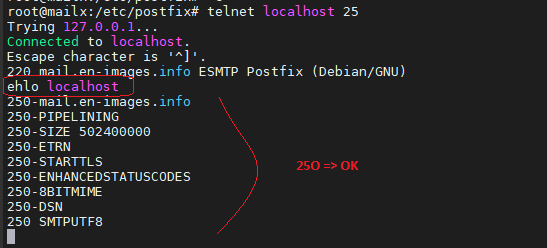
Test envoi mail via SMTP
root@mailx:/etc/postfix# apt install bsd-mailx root@mailx:/etc/postfix# echo "tutut"| mail -s "test" chris@en-images.info < /etc/hosts
Côté /var/log/mail.log

« Successful »
Côté /var/mail/vhosts/en-images.info/chris/
root@mailx:/etc/postfix# du -a /var/mail/vhosts/en-images.info/chris/

Activer les Règles Firewall pour le Serveur de Mail
root@mailx:/etc/postfix# iptables -A INPUT -p tcp --dport 993 -j ACCEPT root@mailx:/etc/postfix# iptables -A INPUT -p tcp --dport 587 -j ACCEPT root@mailx:/etc/postfix# iptables -A INPUT -p tcp --dport 143 -j ACCEPT root@mailx:/etc/postfix# iptables -A INPUT -p tcp --dport 995 -j ACCEPT root@mailx:/etc/postfix# iptables -A INPUT -p tcp --dport 25 -j ACCEPT

15°) Paramètrage Client Mail (Outlook)
On récupère bien les deux mails stockés sur /var/mail/vhosts/en-images.info/chris/

16°) Installation KEY DKIM (DNS OVH => Serveur de mail)
root@mailx:/etc/postfix# apt-get install opendkim opendkim-tools root@mailx:/etc/postfix# cp /etc/opendkim.conf{,.ori}
root@mailx:/etc/postfix# vi /etc/opendkim.conf
AutoRestart Yes
AutoRestartRate 10/1h
UMask 002
Syslog Yes
SyslogSuccess Yes
LogWhy Yes
OversignHeaders From
AlwaysAddARHeader Yes
Canonicalization relaxed/simple
ExternalIgnoreList refile:/etc/opendkim/TrustedHosts
InternalHosts refile:/etc/opendkim/TrustedHosts
KeyTable refile:/etc/opendkim/KeyTable
SigningTable refile:/etc/opendkim/SigningTable
Mode sv
PidFile /var/run/opendkim/opendkim.pid
SignatureAlgorithm rsa-sha256
UserID opendkim:opendkim
Socket local:/var/spool/postfix/opendkim/opendkim.sock
Configuration DKIM => Postfix
root@mailx:/etc/postfix# mkdir /var/spool/postfix/opendkim root@mailx:/etc/postfix# chown opendkim: /var/spool/postfix/opendkim root@mailx:/etc/postfix# usermod -aG opendkim postfix
root@mailx:/etc/postfix# vi /etc/postfix/main.cf ####################### # OPENDKIM ###################### milter_protocol = 6 milter_default_action = accept smtpd_milters = unix:/opendkim/opendkim.sock, unix:/clamav/clamav-milter.ctl non_smtpd_milters = unix:/opendkim/opendkim.sock
Configuration des « True » Host
root@mail001:/etc# mkdir -p /etc/opendkim/keys
root@mailx:/etc/postfix# vi /etc/opendkim/TrustedHosts 127.0.0.1 localhost ::1 *.en-images.info
Configuration des tables des Keys
root@mailx:/etc/postfix# vi /etc/opendkim/KeyTable
mail._domainkey.en-images.info en-images.info:mail:/etc/opendkim/keys/en-images.info/mail.private
Configuration des tables Signés
root@mailx:/etc/postfix# vi /etc/opendkim/SigningTable *@en-images.info mail._domainkey.en-images.info
Création de la KEY DKIM
root@mailx:/etc/postfix# cd /etc/opendkim/keys root@mailx:/etc/opendkim/keys# mkdir en-images.info && cd en-images.info root@mailx:/etc/opendkim/keys/en-images.info# opendkim-genkey -s mail -d en-images.info -b 1024 root@mailx:/etc/opendkim/keys/en-images.info# chown opendkim:opendkim mail.private
Redémarrage des Services
root@mailx:/etc/opendkim/keys/en-images.info# service postfix restart root@mailx:/etc/opendkim/keys/en-images.info# service dovecot restart root@mailx:/etc/opendkim/keys/en-images.info# service opendkim restart root@mailx:/etc/opendkim/keys/en-images.info# systemctl enable postfix root@mailx:/etc/opendkim/keys/en-images.info# systemctl enable dovecot root@mailx:/etc/opendkim/keys/en-images.info# systemctl enable opendkim
17° ) Ajouter un champ SPF dans le DNS OVH

Ajouter un champ DKIM dans le DNS OVH
Liste la KEY Public à copier dans la Zone DNS OVH
root@mailx:/etc/opendkim/keys/en-images.info# cat /etc/opendkim/keys/en-images.info/mail.txt

Copier la KEY et ajouter celle-ci au champ DKIM d’OVH
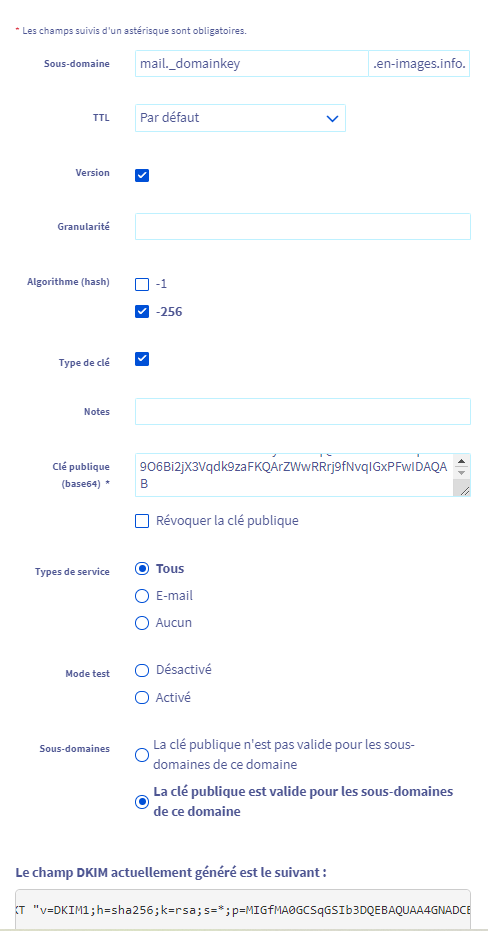
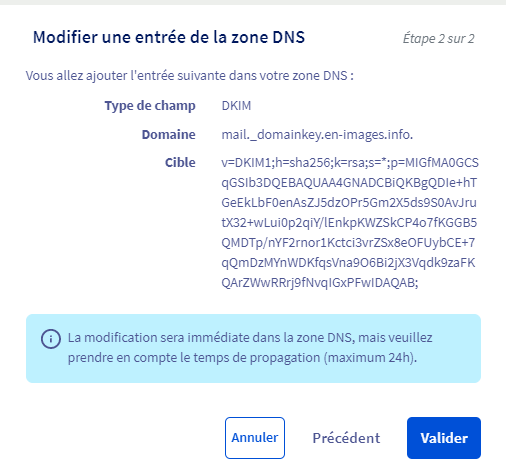

Test Mail avec Cetificat DKIM via DNS OVH
root@mailx:/etc/opendkim/keys/en-images.info# echo "tutut"| mail -s "test" chris@en-images.info

18°) Installation SPAMASSASSIN ( Anti SPAM )
root@mailx:/etc/opendkim/keys/en-images.info# apt-get install spamassassin spamc
Ajout des règles pour le traitement avec SPAMASSASSIN
root@mailx:/etc/opendkim/keys/en-images.info# vi /etc/postfix/master.cf smtp inet n - y - - smtpd -o content_filter=spamassassin submission inet n - y - - smtpd -o syslog_name=postfix/submission -o smtpd_tls_dh1024_param_file=${config_directory}/dh2048.pem -o smtpd_tls_security_level=encrypt -o smtpd_sasl_auth_enable=yes -o smtpd_client_restrictions=permit_sasl_authenticated,reject -o content_filter=spamassassin
A la fin du fichier
spamassassin unix - n n - - pipe
user=debian-spamd argv=/usr/bin/spamc -f -e /usr/sbin/sendmail -oi -f ${sender} ${recipient}
Configuration SPAMASSASSIN
root@mailx:/etc/opendkim/keys/en-images.info# vi /etc/spamassassin/local.cf
rewrite_header Subject *****SPAM*****
A la fin du fichier
report_safe 0
whitelist_auth *@en-images.info
add_header all Report _REPORT_
add_header spam Flag _YESNOCAPS_
add_header all Status _YESNO_, score=_SCORE_ required=_REQD_ tests=_TESTS_ autolearn=_AUTOLEARN_ version=_VERSION_
add_header all Level _STARS(*)_
add_header all Checker-Version SpamAssassin _VERSION_ (_SUBVERSION_) on _HOSTNAME_
root@mailx:/etc/opendkim/keys/en-images.info# systemctl enable spamassassin root@mailx:/etc/opendkim/keys/en-images.info# systemctl start spamassassin
root@mailx:/etc/opendkim/keys/en-images.info# crontab –e
20 02 * * * /usr/bin/sa-update
# Auto-apprentissage de spam assassin
30 02 * * * /usr/bin/sa-learn --ham /var/mail/vhosts/domain.tld/utilisateur/mail/cur/*
40 02 * * * /usr/bin/sa-learn --spam /var/mail/vhosts/domain.tld/utilisateur/mail/.Junk/cur/*
19°) Installation SIEVE (Email Filtering Language)
root@mailx:/etc/opendkim/keys/en-images.info# apt-get install dovecot-sieve dovecot-managesieved
root@mailx:/etc/opendkim/keys/en-images.info# vi /etc/dovecot/dovecot.conf !include_try /usr/share/dovecot/protocols.d/*.protocol protocols = imap lmtp sieve listen = * !include conf.d/*.conf
Configuration lmtp
root@mailx:/etc/opendkim/keys/en-images.info# vi /etc/dovecot/conf.d/20-lmtp.conf protocol lmtp { postmaster_address = postmaster@en-images.info mail_plugins = $mail_plugins sieve }
Configuration SIEVE
root@mailx:/etc/opendkim/keys/en-images.info# vi /etc/dovecot/conf.d/90-sieve.conf plugin { sieve = /var/mail/vhosts/%d/%n/.dovecot.sieve sieve_default = /var/mail/sieve/default.sieve sieve_dir = /var/mail/vhosts/%d/%n/sieve sieve_global_dir = /var/mail/sieve }
Création de directory SIEVE et Définition Filtre
root@mailx:/etc/opendkim/keys/en-images.info# mkdir /var/mail/sieve/ root@mailx:/etc/opendkim/keys/en-images.info# touch /var/mail/sieve/default.sieve && chown -R vmail:vmail /var/mail/sieve
root@mailx:/etc/opendkim/keys/en-images.info# vi /var/mail/sieve/default.sieve
require ["fileinto"];
if header :contains "Subject" "*****SPAM*****" {
fileinto "Junk";
}
Lancement du Service SIEVE
root@mailx:/etc/opendkim/keys/en-images.info# sievec /var/mail/sieve/default.sieve root@mailx:/etc/opendkim/keys/en-images.info# service dovecot restart
20°) Installation CLAMAV Antivirus
root@mailx:/etc/opendkim/keys/en-images.info# apt-get install clamav-milter root@mailx:/etc/opendkim/keys/en-images.info# service clamav-freshclam stop root@mailx:/etc/opendkim/keys/en-images.info# freshclam root@mailx:/etc/opendkim/keys/en-images.info# service clamav-freshclam start
root@mailx:/etc/opendkim/keys/en-images.info# mkdir /var/spool/postfix/clamav root@mailx:/etc/opendkim/keys/en-images.info# chown clamav /var/spool/postfix/clamav

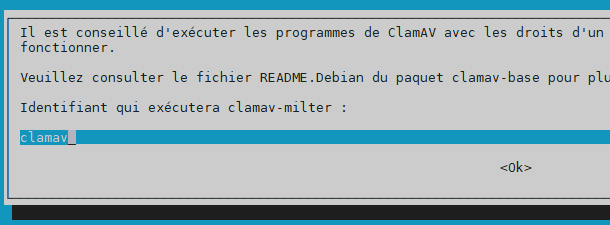

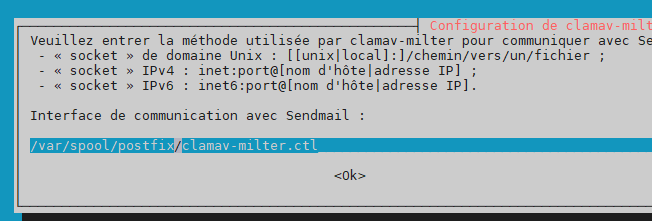



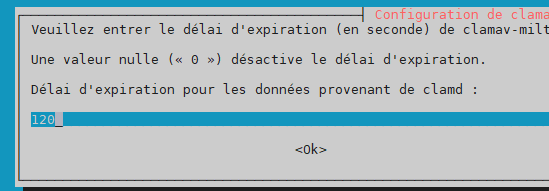







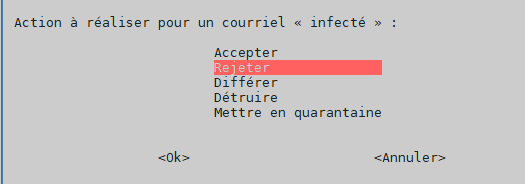









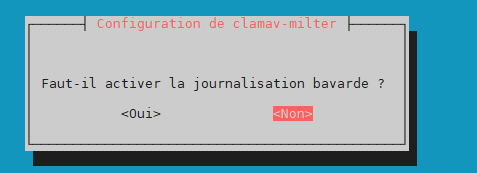





Handle configuration automatically –> yes
User for daemon –> clamav
Additional groups –> laisser le champ vide
path to socket –> /var/spool/postfix/clamav/clamav-milter.ctl
group owner for the socket –> clamav
permissions (mode) for socket –> 666
remove stale socket –> yes
wait timeout for clamd –> 120
foreground –> no
chroot –> laisser le champ vide
pid file –> /var/run/clamav/clamav-milter.pid
temporary path –> /tmp
clamd socket –> unix:/var/run/clamav/clamd.ctl
hosts excluded for scanning –> laisser le champ vide
mail whitelist –> laisser le champ vide
action for « infected » mail –> reject
action on error –> defer
reason for rejection –> Rejecting harmful e-mail: %v found.
headers -> replace
log file –> /var/log/clamav/clamav-milter.log
disable log file locking –> no
maximum log file size –> 50
log time –> yes
use syslog –> no
log facility (type of syslog message) –> LOG_LOCAL6
verbose logging –> no
log level when infected –> off
log level when no threat –> off
size limit for scanned messages –> 25
support multiple recipients –> no
enable log rotation –> yes
root@mailx:/etc/opendkim/keys/en-images.info# service clamav-daemon restart
root@mailx:/etc/opendkim/keys/en-images.info# crontab –e
15 * * * * /usr/bin/freshclam –quiet
root@mailx:/etc/opendkim/keys/en-images.info# vi /etc/postfix/main.cf smtpd_milters = unix:/opendkim/opendkim.sock, unix:/clamav/clamav-milter.ctl
root@mailx:/etc/opendkim/keys/en-images.info# service postfix reload
21°) Installation POP3
root@mailx:/etc/opendkim/keys/en-images.info# apt-get install dovecot-pop3d
Activation Port POP3 Dovecot
root@mailx:/etc/opendkim/keys/en-images.info# vi /etc/dovecot/dovecot.conf protocols = imap lmtp sieve pop3
root@mailx:/etc/opendkim/keys/en-images.info# vi /etc/dovecot/conf.d/10-master.conf
service pop3-login {
inet_listener pop3 {
port = 110
}
inet_listener pop3s {
port = 995
ssl = yes
}
}
service pop3 {
}
root@mailx:/etc/opendkim/keys/en-images.info# service dovecot restart root@mailx:/etc/opendkim/keys/en-images.info# netstat -ptna | grep -i "0.0.0.0:110\|0.0.0.0:995

root@mailx:/etc/opendkim/keys/en-images.info# vi /etc/postfix/header_checks
/^Received:.*with ESMTPSA/ IGNORE
/^X-Originating-IP:/ IGNORE
/^X-Mailer:/ IGNORE
/^User-Agent:/ IGNORE
root@mailx:/etc/opendkim/keys/en-images.info# vi /etc/postfix/main.cf
################
## CACHER HEADER
################
mime_header_checks = regexp:/etc/postfix/header_checks
header_checks = regexp:/etc/postfix/header_checks
root@mailx:/etc/opendkim/keys/en-images.info# postmap /etc/postfix/header_checks root@mailx:/etc/opendkim/keys/en-images.info# postfix reload root@mailx:/etc/opendkim/keys/en-images.info# service postfix restart
Views: 185


